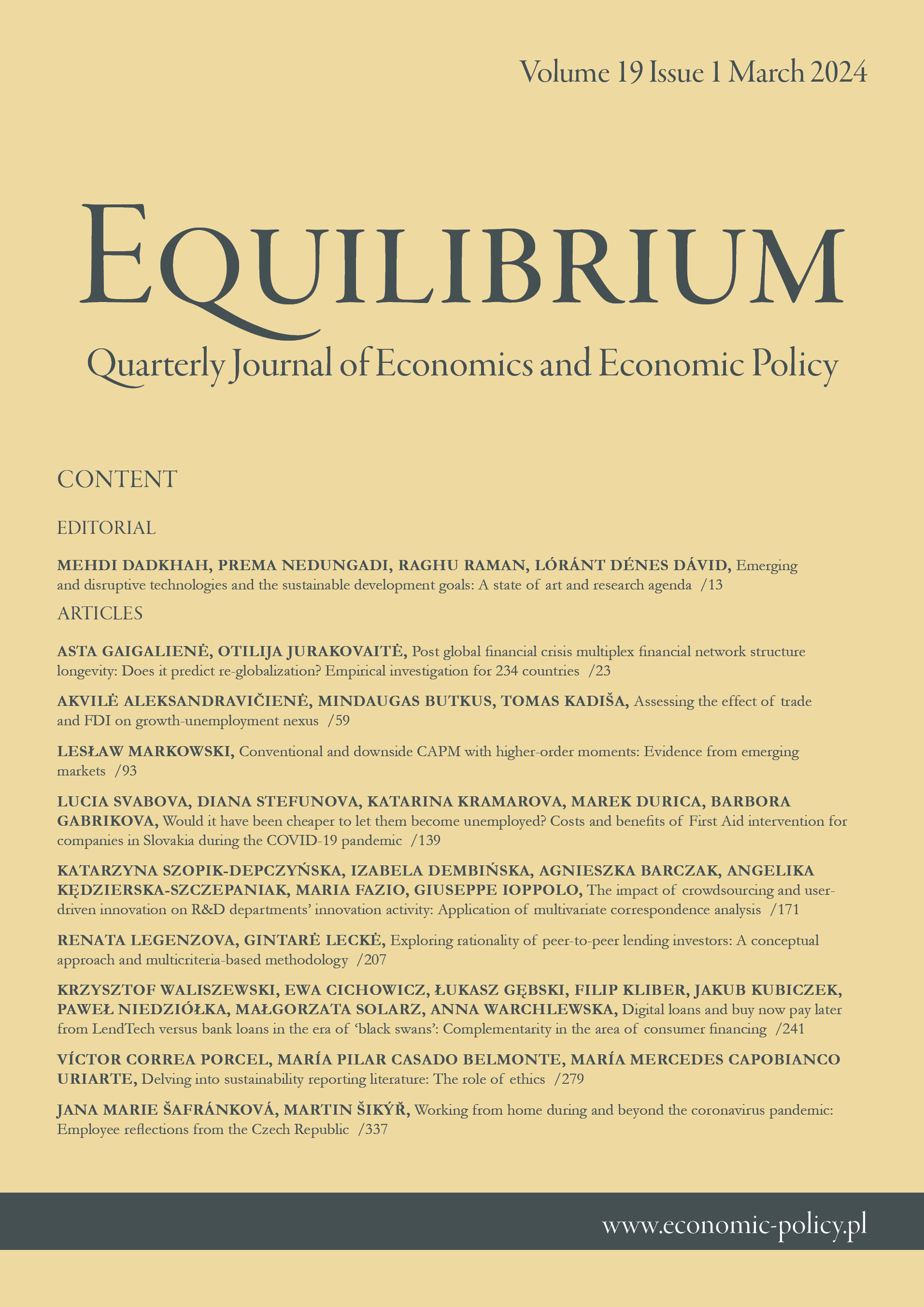Decoupling economic growth from greenhouse gas emissions: the case of the energy sector in V4 countries
IF 6.2
Q1 ECONOMICS
Equilibrium-Quarterly Journal of Economics and Economic Policy
Pub Date : 2020-06-24
DOI:10.24136/eq.2020.011
引用次数: 44
Abstract
Research background: The production and use of energy satisfies human needs, but also gives rise to a host of adverse environmental pressures, such as air pollution and waste generation. The issue of energy efficiency and climate chance resonates in the energy sector as one of the main producers of green-house gas emissions (GHG). While the European Union in general is doing well in reducing emissions and increasing the share of renewables, unfortunately, there are countries that are still far from reaching their goal. Purpose of the article: The paper is focused on the quantitative assessment of the link between the economic growth of the energy sector and the production of GHG emissions by the energy sector in V4 countries during the period 1995–2016. For this purpose, decoupling analysis will be realized. Methods: The decoupling of economic growth and the environmental pressures caused by this growth has a rich tradition within the sustainable development literature. The decoupling method was chosen for its ability to link economic and environmental indicators. Decoupling elasticity will be calculated with the aim of assessing the relationship between the economic growth of the energy sector (measured in GVA) and GHG emissions produced by the energy sector in V4 countries within the research period. Decoupling elasticity indicates different forms of the decoupling and coupling of the two variables. Findings & Value added: The results of the analysis suggest the prevailing strong decoupling of the economic growth of the energy sector and GHG emissions produced by the energy sector, which can be considered a positive trend. The findings of this paper are relevant for the government, state and public institutions and stakeholders in general, who play important roles in the preparation of programs, projects and policies to make energy generation, transport and use more efficient and environmentally sustainable.经济增长与温室气体排放脱钩:V4国家能源部门的案例
研究背景:能源的生产和使用满足了人类的需求,但也带来了一系列不利的环境压力,如空气污染和废物产生。作为温室气体排放的主要生产者之一,能源效率和气候机会问题在能源部门引起了共鸣。尽管欧盟总体上在减少排放和增加可再生能源份额方面做得很好,但不幸的是,仍有一些国家远未实现其目标。文章目的:本文重点对1995-2016年期间V4国家能源部门的经济增长与能源部门温室气体排放量之间的联系进行定量评估。为此,将实现解耦分析。方法:在可持续发展文献中,经济增长与由此产生的环境压力脱钩有着丰富的传统。之所以选择脱钩方法,是因为它能够将经济和环境指标联系起来。将计算解耦弹性,目的是评估V4国家能源部门的经济增长(以GVA衡量)与能源部门在研究期内产生的GHG排放之间的关系。解耦弹性表示两个变量解耦和耦合的不同形式。调查结果和附加值:分析结果表明,能源部门的经济增长与能源部门产生的温室气体排放之间普遍存在强烈脱钩,这可以被视为一种积极的趋势。本文的研究结果与政府、国家和公共机构以及一般利益相关者有关,他们在制定计划、项目和政策以提高能源生产、运输和使用效率和环境可持续性方面发挥着重要作用。
本文章由计算机程序翻译,如有差异,请以英文原文为准。
求助全文
约1分钟内获得全文
求助全文
来源期刊
CiteScore
9.20
自引率
3.50%
发文量
28
审稿时长
36 weeks
期刊介绍:
Equilibrium. Quarterly Journal of Economics and Economic Policy is a scientific journal dedicated to economics, which is the result of close cooperation between the Instytut Badań Gospodarczych/Institute of Economic Research (Poland) and Polish Economic Society and leading European universities. The journal constitutes a platform for exchange of views of the scientific community, as well as reflects the current status and trends of world science and economy.
The journal especially welcome empirical articles making use of quantitative methods in: Macroeconomics and Monetary Economics, International Economics, Financial Economics and Banking, Public Economics, Business Economics, Labor and Demographic Economics, Economic Development, and Technological Change, and Growth.
Current most preferable topics and special issues:
The economics of artificial intelligence: business potentials and risks;
Digitalization and entrepreneurship in economics;
Sustainable socio-economic development, environmental and ecological economics;
Transition in the energy market (improving energy efficiency, alternative energy sources, renewable energy, energy security).

 求助内容:
求助内容: 应助结果提醒方式:
应助结果提醒方式:


